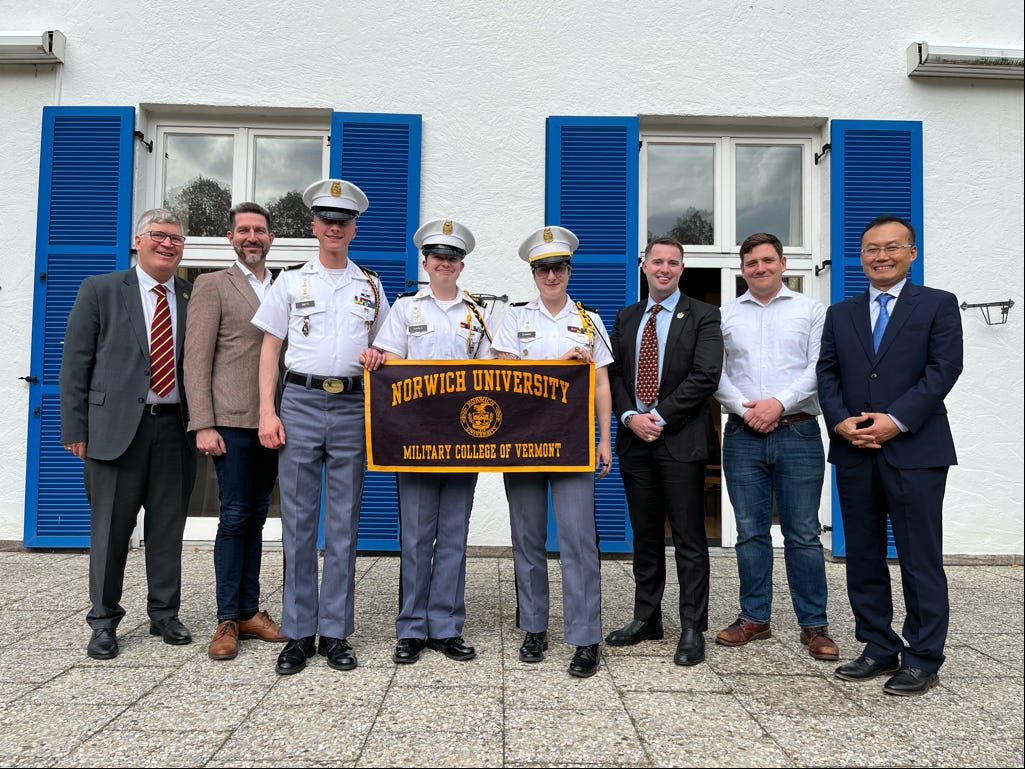
On October 13 to 15, 2023, Peace and War Center Associate Director, Dr. Yangmo Ku, and three Norwich University students attended the 2023 VdRBw-ROA-Partnership Seminar held at the Bundeswehr Medical Academy in Munich, Germany. The focus of the seminar was “Lessons Learned from the Cold War: How to deal with new conventional threats in Europe.”
Below represents each students’ report out from this event.
Isabella Dunning, Army ROTC
Isabella Dunning is a fourth-year student at Norwich University pursing a degree in Criminal Justice (BA) with minors in pre-law, leadership, and psychology and a certificate of military studies- Army. She is enrolled in the Army Reserve Officer Training Corps (ROTC) and is the recipient of a national four-year ROTC scholarship, which has allowed her to engage in valuable training to prepare to become a Second Lieutenant in the Unites States Army. She received the American Legion Scholastic Excellence medal and ribbon for her academic success within the classroom. In regard to extracurricular activities, Isabella is a member of the Junior Ring Committee, Norwich Christian Fellowship, and Uniform Committee. Isabella has worked as a substitute teacher for the grade level of kindergarten through twelfth grade for the last three years. While at school, she works for the admission office as an intern and leads the Cadet Ambassador program.
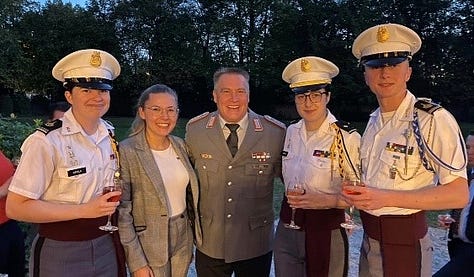
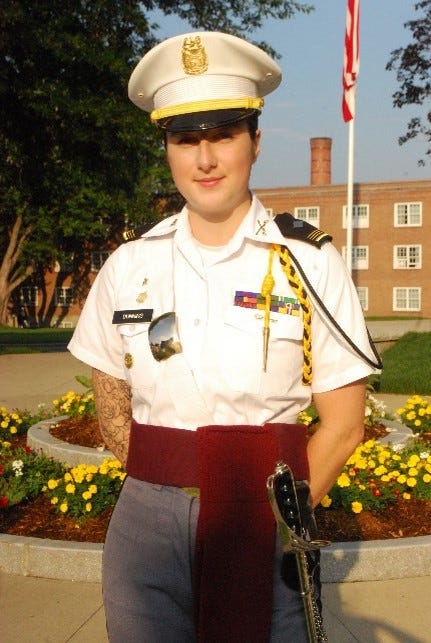
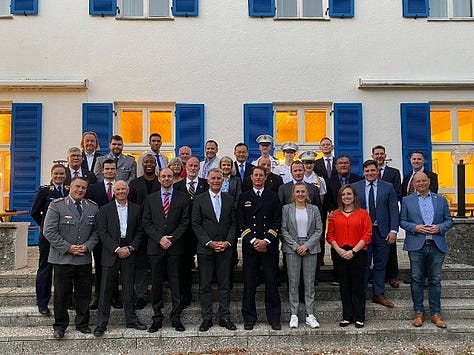
Overview: Nuclear Deterrence Briefing
Dr. Yangmo Ku, a political science professor at Norwich University, briefed the group on Nuclear Deterrence during the Cold War and the new Cold War. He highlighted the intensifying United States – China rivalry on the realms of economy, military, technology, and values. There has been a growing geopolitical confrontation between China, Russia and North Korea vs. the United States, Japan, and South Korea which has developed very little leverage towards North Koreas’ nuclear and missile adventurism. In the European context, “increased stability at nuclear level reduces stability at conventional level and Russia’s ‘escalate to de-escalate’ doctrine is concerning.”
Overview: U.S. Panzers through Germany Briefing
Dr. Robert Munson, a civilian contractor for the U.S Army at the 21st Theater Sustainment Command, briefed the group on host nation support. “We have little combat power; we’re surrounded by friends… or? We discussed our central support for NATO is located in Europe. In this environment, the U.S troops bring the combat power while Bundeswehr provides the logistical power. We discussed that Germany would support U.S deployment by supplying security, transportation, medical aid, and 26 airfields. What does this mean for us now? Training exercises are limited to specific areas, the division line has increased, and this is a “process that we must work together through.”
“A process we must work though together to accomplish…"
Example A: If the United States would deploy a division to Europe, it would take 60 days to unload ships at a single port. This would require a “convoy support center” to conduct fuel, maintenance, and recovery operations. This space requires a minimum of a 350m x 300m facility. The United States would control four locations in South: Rhine Ordnance Barracks, Grafenwöhr Camp Aachen, Grafenwöhr Camp Kasserine, and Hohenfies.
Overview: The “old” Cold War - Lessons of the Present Briefing
Dr. Beatrice Heuser briefed the group on how the cold war began. Did the cold war begin in 1917 with the Russian revolution, in 1944 with tension among allies in World War II, or in 1947 with the Truman Doctrine? Did the Cold War end in 1989 with the fall of the wall, in 1991 with the dissolution of the Warsaw Pact, or did it never end?
Lessons of the 1930’s for post WWI reconstruction
“Acculturation” of leaders with other ideologies does not work.
Clash with Communism
The League of Nation was not successful without the USA.
France and the United Kingdom could not check the three rogue powers (Germany, Italy, and Japan).
New world organization must include the USA.
Dunning Main Takeaways
Effective communication between the United State and Germany is critical to NATO success.
“Nuclear stability- instability paradox” shadows over the potential of a nuclear attack.
The United States and Germany need to “invest in peace and stability” to create a stable environment.
I just wanted to extend a special thank you to the Reserve Officers of the Reserve Officers Association of the Unted States and the German Armed Forces Reservists Association to giving the Norwich Students and Professor Ku the opportunity to attend this seminar. We will take these lessons and pass them among! We are forever grateful.
Megan Juhola, Navy ROTC
CDT Juhola is a junior at Norwich University, Majoring in Mechanical Engineering with a 3-year national Navy ROTC scholarship. She is contracted with the US Navy and will commission in May 2025. At Norwich she is heavily involved in Band being the Company 1SG, Drum Major, and a training NCO for Prospect Training. She is also apart of the American Society for Mechanical Engineers (ASME), Society for Women Engineers (SWE), and the Ski club.
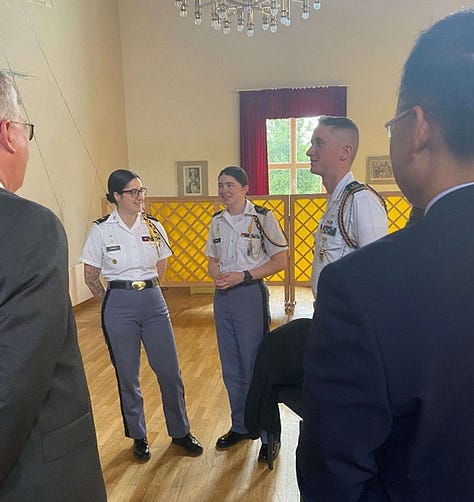
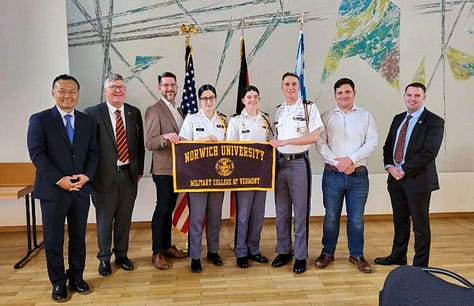
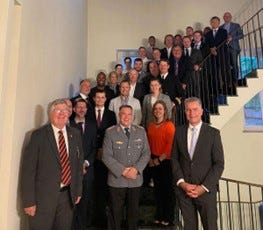
Day Two Activities:
-Seminar Block 1: “US Panzers through Germany? (But only with German help)” by Dr. Robert Munson
-Seminar Block 2: “Nuclear Deterrence in Europe: Cold War vs New Cold War” by Dr. Yangmo Ku
-Seminar Block 3: “Cold War I and Cold War II: Similarities and Differences” by Dr. Beatrice Heuser
-Seminar Block 4: German Reserve Officer Briefing
-Walking Tour of Munich
-Dinner with the ROA
Lessons Learned – Day Two: The United States and Germany both play key roles in nuclear deterrence in Europe. Germany being a centrally located nation in Europe, will be a staging ground for many U.S. troops. However, this brings up the problem of where to stage all the troops and their equipment. There are many logistical problems that both the Germans and United States will face if a conflict arises. Both countries will need to work together and communicate effectively in order to accomplish the mission. With that said, there is also a “nuclear stability-instability paradox” in Europe. The threat of nuclear war potentially looms over the world’s shoulders. While these bombs might deter all-out nuclear war, it has, and is causing greater tensions in smaller conflicts. Russian and Chinese influence is now world-wide, these two countries are helping poorer nations build soccer stadiums and provide shelters in rural areas. The United States and Germany on the other hand are nowhere to be seen. United States influence has been heavily declining, and Russia and China have taken our place in return. This will be potential problem for the United States and her allies, as we face an up-hill battle trying to gain the trust of these nations, now under the Chinese and Russian influence, back. Germany and the United States need to “invest in peace and stability” in order to create a world where instability and nuclear war is not looming over people’s shoulders. The seminars and topics that were discussed put things into perspective of where things stand in the world right now. It showed the importance of good relations between the United States and Germany, because we will both play key roles in the next major conflict in Europe.
Juhola Personal Statement: The ROA seminar was an amazing opportunity to be a part of. It was a great opportunity to learn from both the German and United States colleges in both the civilian and military sectors. This was my first international trip, so it was an amazing opportunity to go explore the culture and see the beautiful city of Munich. The seminar also allowed us (Cadets) to be able to talk and share our personal experiences with the German students as well.
Joshua Smith, Air Force ROTC
CDT Smith is an academic senior at Norwich University, majoring in International Studies and minoring in French, with a concentration in Aerospace studies. An AFROTC 2-year scholarship recipient, he is contracted and will commission in the Spring ’24 semester into the Security Forces branch. Through the Spring semester and early summer of 2023, Joshua participated in a military exchange with École Spéciale Militaire de Saint-Cyr, the land force’s academy of France at Qoetquidan, Brittany. Upon returning from abroad, he served as a Cadet Training Assistant at Maxwell AFB for Field Training. At Norwich, he is highly involved in the Corps of Cadets as a member of the NUCC Cavalry Troop, NUCC Pipes & Drums, the Mountain Cold Weather Company, the Lt. Col. Earle W. Kelly Squadron of Arnold Air Society, and the Honor Committee.
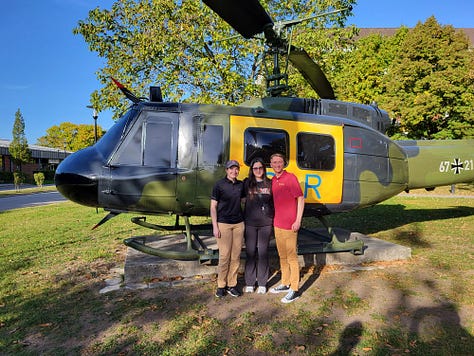
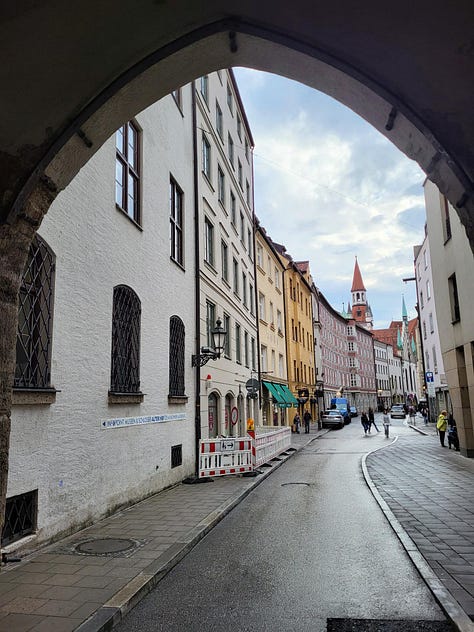
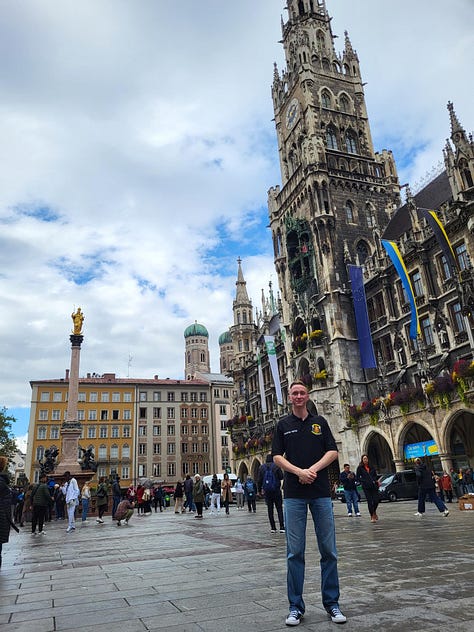
Day Three Activities:
- Frühstück
-Seminar Block 5: “Joint Security Support Cell – Interoperability with NATO and Deutschland,” from 7th Mission Support Command
- “The Citizen Soldier,” presented by Cadets Dunning, Smith, and Juhola
-Award Ceremony
Lessons learned – Day Two: While stationing a standing force of over 47,000 troops throughout the country, the US Army logistics force and the Bundeswehr work diligently to provide assets and commodities which are critical to both people and mission. As the war in Ukraine transmits tensions westward through Europe, the strategy of “Dreisheibe,” or “Turn Table Germany” envisions the country as massive logistical hub of supplies and troops which can be revolved and mobilized to support any neighboring ally in need. To provide this critical support, the 7th Mission Support Command is tasked with collaborating with German governmental and military units one-on-one to ensure the movement of critical military assets, while maintaining and expanding the working relationship between German Commandos and American counterparts. This partnership which is becoming more critical each day can only be maintained through mutual allied support. Another important and special lesson I learned at the Sanitätsakademie is to never discount the power of military discourse over a hearty German meal. I shared the sincerest one-on-one conversations with German and American officers alike while partaking in celebrated Bavarian cuisine. The city of Munich and region of Bavaria have a deep history, and so do the German military members who ensure the vital accessibility and cooperation with US military presence.
Smith Personal Statement: The ROA Partnership Seminar broadened my international and military perspective with incredible insight into the workings of the Sanitätsakademie der Bundeswehr, and the extensive collaborative operations which the US Armed Forces and the Bundestag conduct each day. An informed international perspective—especially to military officers—is enshrined throughout Norwich doctrine, and I was honored to have the opportunity to represent the explorative Norwich spirit while learning valuable lessons from our German counterparts. I have learned that becoming educated in the capabilities and offering of our allies is extremely important to the US Armed Forces strategy, and that collaboration even at the Cadet level will foster better intercultural and military cooperation to come.




